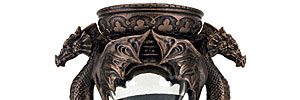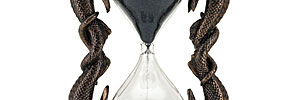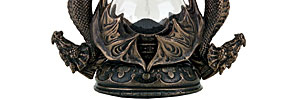The dragon is a legendary creature with serpentine or otherwise reptilian traits in the myths of many cultures. The word 'dragon' derives from Greek δράκων (drakōn), 'a serpent of huge size, a python, a dragon' and that from δρακεῖν (drakein) aorist infinitive active of the verb δέρκομαι (derkomai) 'I see clearly'. Dragons are usually shown in modern times with a body like a huge lizard, or a snake with two pairs of lizard-type legs, and able to emit fire from its mouth. The European dragon has bat-type wings growing from its back.
Although dragons occur in many legends around the world, different cultures have varying stories about monsters that have been grouped together under the dragon label. Dragons are often held to have major spiritual significance in various religions and cultures around the world. In many Asian cultures dragons were, and in some cultures still are, revered as representative of the primal forces of nature, religion and the universe. They are associated with wisdom (often said to be wiser than humans) and longevity. They are commonly said to possess some form of magic or other supernatural power, and are often associated with wells, rain, and rivers. In some cultures, they are also said to be capable of human speech.
Cold Cast is a modern method of casting sculptures using a mixture of resin and powdered polymer materials. The finished sculpture has a surface which looks very similar to traditionally cast material, but tends to be much lighter.













